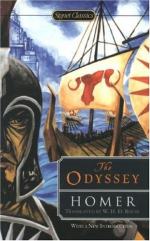Then the soul of the son of Atreus answered, and spake: ’Happy art thou son of Peleus, godlike Achilles, that didst die in Troy-land far from Argos, and about thee fell others, the best of the sons of Trojans and Achaeans, fighting for thy body; but thou in the whirl of dust layest mighty and mightily fallen, forgetful of thy chivalry. And we strove the livelong day, nor would we ever have ceased from the fight, if Zeus had not stayed us with a tempest. Anon when we had borne thee to the ships from out of the battle, we laid thee on a bier and washed thy fair flesh clean with warm water and unguents, and around thee the Danaans shed many a hot tear and shore their hair. And forth from the sea came thy mother with the deathless maidens of the waters, when they heard the tidings; and a wonderful wailing rose over the deep, and trembling fell on the limbs of all the Achaeans. Yea, and they would have sprung up and departed to the hollow ships, had not one held them back that knew much lore from of old, Nestor, whose counsel proved heretofore the best. Out of his good will he made harangue, and spake among them:
’"Hold, ye Argives, flee not, young lords of the Achaeans. Lo, his mother from the sea is she that comes, with the deathless maidens of the waters, to behold the face of her dead son.”
’So he spake, and the high-hearted Achaeans ceased from their flight. Then round thee stood the daughters of the ancient one of the sea, holding a pitiful lament, and they clad thee about in raiment incorruptible. And all the nine Muses one to the other replying with sweet voices began the dirge; there thou wouldest not have seen an Argive but wept, so mightily rose up the clear chant. Thus for seventeen days and nights continually did we all bewail thee, immortal gods and mortal men. On the eighteenth day we gave thy body to the flames, and many well-fatted sheep we slew around thee, and kine of shambling gait. So thou wert burned in the garments of the gods, and in much unguents and in sweet honey, and many heroes of the Achaeans moved mail-clad around the pyre when thou wast burning, both footmen and horse, and great was the noise that arose. But when the flame of Hephaestus had utterly abolished thee, lo, in the morning we gathered together thy white bones, Achilles, and bestowed them in unmixed wine and in unguents. Thy mother gave a twy-handled golden urn, and said that it was the gift of Dionysus, and the workmanship of renowned Hephaestus. Therein lie thy white bones, great Achilles, and mingled therewith the bones of Patroclus son of Menoetias, that is dead, but apart is the dust of Antilochus, whom thou didst honour above all thy other companions, after Patroclus that was dead. Then over them did we pile a great and goodly tomb, we the holy host of Argive warriors, high on a jutting headland over wide Hellespont, that it might be far seen from off the sea by men that now are, and by those that shall be hereafter.




